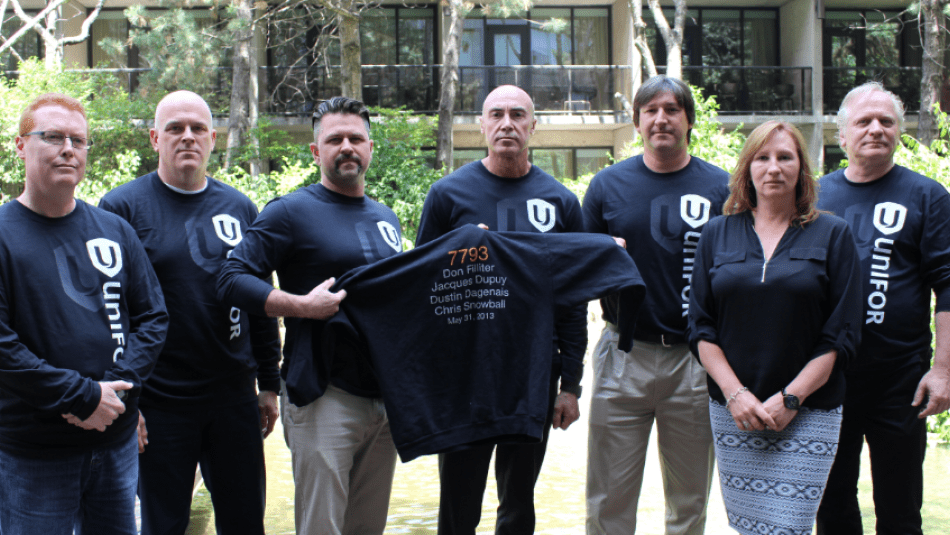
Share
R to L: Unifor Paramedics John Sloan, Mike Chad, Wayde Diamond, Chuck Telky and Dan Lefebvre with Unifor National Representative Kelly-Anne Orr and Unifor Director of Health Corey Vemey remember the fallen as new TSB report finds system failed Ornge helicopter crew.
Unifor believes the crew members who perished in a fatal 2013 helicopter crash in Moosonee, ON were failed by Ornge. A damning report by The Transport Safety Board of Canada found that the flight crew were not properly trained to fly in night-time conditions and that organizational, regulatory and oversight deficiencies led to the fatal crash.
Paramedics Chris Snowball, 38 and Dustin Dagenais, 34, both husbands and fathers, died alongside the pilots in the incident. They were members of Unifor Local 2002.
“We do not believe that safety was a priority for Ornge at the time of the crash, we do not believe safety is a priority now,” said Chuck Telky, Unifor Unit Chair, Ornge Paramedics. “The safety culture at Ornge is the bare-minimum, to get the job done first and foremost, and that still exists. We do not believe cultural change, substantive change, is possible while the same management team that allowed these conditions to exist in 2013 remains today.”
In its report the Transport Safety Board of Canada (TSB) determined Ornge training, standard operating procedures, supervision and staffing in key safety/supervisory positions did not ensure that the crew was ready to conduct the challenging flight into an area of total darkness.
“This accident goes beyond the actions of a single flight crew,” said TSB Chair Kathy Fox. “Ornge RW did not have sufficient experienced resources in place to effectively manage safety.”
Unifor says that Ornge has been slow to act on improved safety protocols, and that three-years after the fatal crash crews still do not have access to advanced safety training and equipment such as night-vision goggles.
“Ornge continues to respond to systemic issues that led to the last crash, they are not working proactively to prevent the next one,” said Unifor Director of Health Care Corey Vermey. “Oversight of Ornge by the Province has been almost non-existent; it’s time for the Wynne government to step up to protect pilots, paramedics and patients.”
The TSB report makes 14 recommendations in the three key areas of regulatory oversight, flight rules and pilot readiness and aircraft equipment. Unifor National and workplace representatives look forward to the implementation of the TSB recommendations and will continue to work diligently with Ornge to ensure the health and safety of paramedics during flights. Safety is – and will always be – of paramount concern. We owe a tremendous obligation in memory of our brothers who lost their lives in this tragedy to ensure that no more lives are lost.


